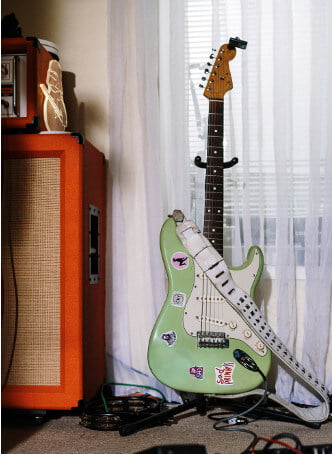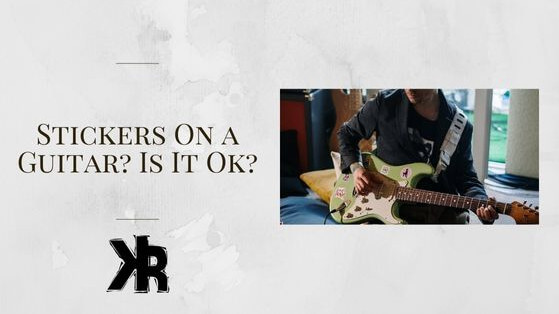Table of Contents
Back in the 90s, when teenage angst and grunge music were alive and well, stickers were a part of the guitar look. Not because of the way it looked, but because of what the musician believed and stood for.
The instrument was a tool used to make a stand for something. Sometimes even if that was never realized. This was normally done by applying stickers to everything. And even today, people still ask if it’s ok to put stickers on a guitar.
It’s completely safe to put stickers on most guitars. The sticker may leave behind some residue when it’s removed. But the more common guitar finish will not be affected unless it’s scratched off. Nitrocellulose guitar finishes, however, will be damaged.
It’s best to verify that the surface is a polyurethane or polyester finish. If it’s a delicate or sensitive coating, you may want to keep the stickers off this one.
Sticker Summary
- Electric vs Acoustic Guitar: Stickers on an electric guitar are generally acceptable, but on an acoustic, they can affect the tone and damage the guitar if removed.
- Placement: Avoid putting stickers on the fretboard, pickups, and bridge of an electric guitar.
- Finish: The finish of the guitar may not fade equally if a sticker is left on for years and then removed.
- Sound: While the placement of guitar stickers on an instrument may temporarily alter the sound, they are safe for musicians to use.
The Debate: Is It Bad To Put Stickers On a Guitar?
The question of affixing stickers to a guitar has long been a subject of discussion. It often divides the guitar community into two opposing camps.
On one side, there are those who see stickers as a form of personal expression, a way to make an instrument truly one’s own. They argue that the impact on the guitar’s sound is minimal, if noticeable at all, and that the aesthetic benefits outweigh any potential downsides.
Conversely, the opposing viewpoint holds that stickers can interfere with the natural resonance and tone of the wood, particularly in acoustic guitars. This group often cites the importance of preserving the instrument in its original state for both performance and potential resale value.
They caution that even if the sound impact is minimal, the adhesive from stickers can affect the finish of the guitar, leading to long-term damage.
This debate extends beyond just individual guitar owners and includes manufacturers and professional musicians. Some guitar makers explicitly advise against the use of stickers, while others remain neutral.
Professional musicians also vary in their stance, with some proudly displaying sticker-clad guitars during performances, and others opting for an unadorned look to ensure optimal sound quality.
Expert Opinions
When it comes to the subject of putting stickers on guitars, expert opinions offer valuable insights that can help guide your decision. One of the most cited authorities on this topic is Rodrigo Ibieta, a Fender Acoustic Product Specialist.
According to Ibieta, the impact of stickers on a guitar’s tone is “negligible.” He states that unless the guitar is covered in a thick layer of stickers, most people won’t notice a significant change in sound quality.
However, it’s essential to note that the type of guitar can also influence expert advice. For instance, acoustic guitars are generally more sensitive to modifications than electrics.
Some experts in acoustic guitar construction warn that stickers can potentially dampen the natural vibrations of the wood, thereby affecting the tone.
On the electric guitar front, the consensus is generally more lenient. Given that the sound is electronically amplified, the tonal impact of stickers is often considered minimal.
However, experts caution against placing stickers on specific components like the pickups, fretboard, and bridge, as these are critical areas for sound production.
Additionally, luthiers—those who build and repair guitars—often advise against using stickers with strong adhesives that could damage the guitar’s finish. They recommend using easily removable stickers if you choose to decorate your instrument.
While there is no universal agreement among experts, the consensus leans towards a moderate approach: stickers are generally acceptable but should be applied thoughtfully and cautiously, considering the type of guitar and its components.
Community Opinions
The debate over the appropriateness of putting stickers on guitars isn’t confined to experts; it’s a hot topic within the broader guitar community as well. Online forums, social media platforms, and even local guitar clubs often feature lively discussions on the subject.
Forums and Online Communities
In platforms like Reddit and specialized guitar forums, opinions vary widely. Some users share their positive experiences, stating that stickers have allowed them to personalize their instruments without any noticeable impact on sound quality.
Others caution against it, citing instances where the adhesive damaged the guitar’s finish or where they believe the tone was affected.
Social Media
On platforms like Instagram and Twitter, you’ll find a plethora of images showcasing sticker-adorned guitars, often accompanied by hashtags like #GuitarStickers or #PersonalizedGuitar.
These posts usually receive a mix of reactions, ranging from admiration for the creativity to warnings about potential damage or tonal changes.
Where to Place Stickers Safely
If you’ve decided to go ahead and personalize your guitar with stickers, it’s crucial to know the safe areas where you can place them without compromising the instrument’s performance. Here are some guidelines to consider:
Acoustic Guitars
- Body: The back and sides are generally safe areas. However, avoid placing stickers on the front soundboard, as it is vital for sound resonance.
- Headstock: This is another safe area but ensure the stickers don’t interfere with the tuning pegs.
Electric Guitars
- Body: Similar to acoustic guitars, the back and sides are usually safe. However, steer clear of the area near the pickups. The pick guard is also safe.
- Headstock: As with acoustic guitars, the headstock is generally a safe zone as long as the stickers don’t interfere with the tuning pegs.
Bass Guitars
- Body: The rules are similar to those for electric guitars. The back and sides are generally safe, but avoid the pickups.
- Headstock: Again, this area is usually safe as long as you avoid the tuning mechanisms.
Areas to Avoid
- Fretboard: Stickers here can interfere with playability.
- Pickups: Stickers can affect the magnetic field and thus the sound.
- Bridge: This is a critical area for sound and should be avoided.
Additional Tips
- Use stickers with mild adhesives that can be easily removed.
- Before applying, clean the area where you intend to place the sticker to ensure better adhesion and to minimize potential damage to the finish.
By following these guidelines, you can enjoy the aesthetic benefits of stickers while minimizing any potential negative impact on your guitar’s performance.
How To Take Stickers Off a Guitar
This depends on the type of adhesive used, and the amount of time it has been on the guitar. It should pull off when done slowly. This of course depends on the type of sticker it is as well.
Paper stickers will be a bit tricky and might tear as you try to remove them. The decal type might be more rigid and remain intact as you lift it off. But you might be successful in just using your nails. Stickers that are more problematic will require a better solution, but can come off.
We have a few suggestions that might work. They have certainly helped others. But the risk of damaging your finish increases. So proceed at your own risk.
Wet Cloth Technique
First, you may want to try simply a wet cloth. Put it over top of the sticker and let it soak the paper. Sometimes this is all you need to remove it. Give it the proper time to saturate the sticker and try your luck again with your nail.
For some people, this is all that is needed to get the sticker and adhesive off. For others a bit of scrubbing with a damp cloth, one that will not scratch the finish, gets the job done.
Goo Gone Technique
I suggest you try Goo Gone adhesive remover for the stickers and adhesive that just won’t budge. This is some powerful stuff, but won’t ruin the finish of most guitars.
For any finish that seems very sensitive or delicate, you are proceeding at your own risk. If you truly feel your guitar top coat is very sensitive, you might want to consult a tech or luthier for advice.
We have used Goo Gone to remove stickers and had good success. Some are more stubborn than others, but this stuff got them off. There are many other people who have been successful when using it as well and had good results.

Stickers That Are Safe For Guitars
When choosing to put stickers on a guitar, we suggest you look more towards vinyl or decal type. You will want to make sure they are fairly rigid and hold together well.
Testing the glue on a sticker is also suggested. If you have a double and can leave it on something for a few days. This can also help you decide if this sticker is a good idea or not. If you are looking at paper stickers, you may want to make sure that they will come off well later.
Fretboard Stickers
There are some on the market that you can apply to your fretboard. They can help you with note memorization in conjunction with the dots or inlays.
These stickers are made of vinyl and have glue that is easy to remove. These are the ones that we can get behind, they have a huge benefit when it comes to learning the notes on a fretboard.
They nicely tuck under the strings and are not affected when you play. This is a very handy tool when you are learning how to play.
If you need to stick something to your guitar, look into these learning the fretboard note map decals!
FAQs
How Many Stickers Can I Put On a Guitar?
Are you are putting stickers on an acoustic guitar? Then you will want to know that too many of them can in fact affect the sound. Because the acoustic body is a resonant chamber, stickers can impact it negatively. Now, this is very minuscule, but it’s something to be aware of.
Do Stickers Affect the Electric Guitar’s Sound?
If the guitar is electric, then you don’t have anything to worry about. The signal sent to an amplifier is created electrically. So cover it with stickers if you like. It will not have a negative effect on your sound.
Can you put stickers on a bass guitar?
Yes, you can put stickers on a bass guitar. If it’s a solid body electric, it will not affect the sound at all. But, If it’s an acoustic model, it may slightly dampen the sound depending on how many stickers you put on. But it’s negligible and only really a personal choice.
The only real concern is how will they affect the exterior finish. Will the stickers hurt the paint or coating? If you are not concerned with that, then it is fine.

